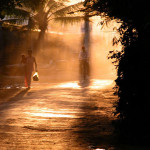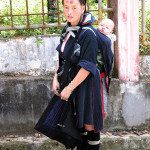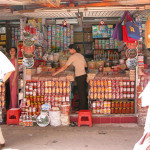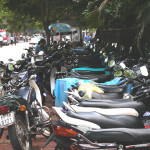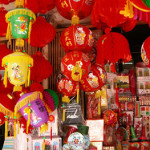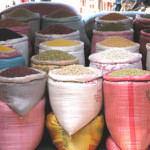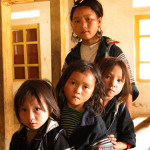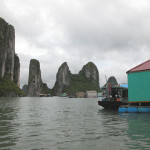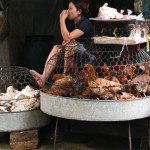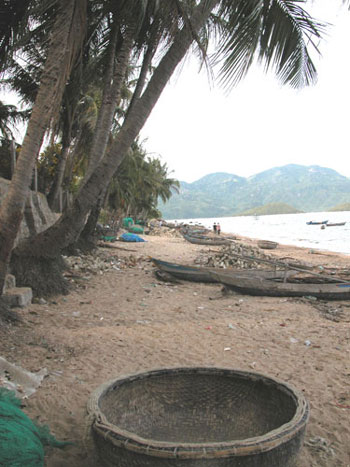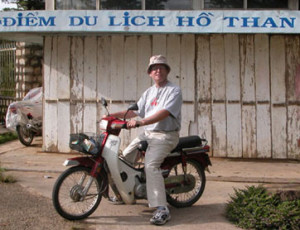
Biker Dude in Dalat, 2003.
It has been nearly forty years since I left Vietnam and recapping my recent five-week trip there is a tough gig, for sure. National and international attitudes have taken drastic shifts since the end of what the Vietnamese call the “American war” – the resulting changes are far too numerous and complex to mention, but none could be more dramatic than the change to the country of Vietnam itself. This was a great trip. Everything about it was positive, save the lost luggage and a return flight that arrived at JFK eighteen hours after the blackout.
The itinerary I planned was designed to return to the familiar and move to the unknown by embarking at Saigon and debarkingfrom HaNoi in hopesthat my ear for the southern dialect could be retuned before I took on the Northern tones. This was modestly successful and I found that my forty-year old language skills, such as they were, were greeted with surprise, genuine appreciation and frequent amusement by both the southerners and northerners. In this regard, with each engagement, I was immediately pegged as a returning veteran for few round-eyes bother to learn the language. English rules and everyone with even the remotest connection to the tourist industry is rushing to become conversant in it. As a a veteran I felt no stigma anywhere in the country; in the south there was frequent expression of gratitude for the sacrifices that they recognized were made by us veterans and in the north there seemed to be a prevailing philosophy that was forward looking and unresentful of the past.
- Back lit biker near Hue
- Black Thai girl with child, SaPa
- Market place in Hue
There were few if any visible vestiges of the war. The new terminal at Tan Son Nhut belies the airport’s key role in all of our tours of duty there. It is a modern, air-conditioned hub just a four dollar taxi ride from the center of Ho Chi Minh City (HCMC). Elsewhere in the country, the bomb craters have been filled in and all of the shell and bomb fragments have been gleaned from the land and sold for scrap. The exception to the absence of war evidence is, of course, the lasting effects of “agent orange” which are only now abating in the landscape thirty-five years ex post facto. It will probably take another thirty before the visual effects disappear; the systemic effects of its use on the land may take another four or five generations to completely dissipate, if then.
HCMC is vibrant and pulsing with energy and commerce. I had spent so little time there on my previous visit that it was an entirely new experience uncolored by the past. The Caravelle and Rex Hotels are still there but they could have been on any of the boulevards for all I could remember. I avoided them this time too, but for budgetary and not security reasons. Part of the energy of the city comes from the constant flow of traffic, most of which comes and goes in the form of motorbikes, the majority of which bear the Honda logo. I was told that there are seven million motorbikes there and after five days of extensive walking throughout the city I felt as if I had dodged most of them much like a matador avoids the bulls.
- HaNoi – Moto parking problem
- HaNoi- paper lantern shop
- Hue – grains by the bag full
Seven million motorbikes demand seven million parking spaces and the local solution is to park on the sidewalks, which, of course, forces those who might deign to walk, for whatever reason, to do so in the streets, which, of course, restricts the flow of motorbikes and slows the entire city down – not such a bad thing, but I doubt that it is a matter of public policy. In spite apparent anarchy and chaos in the streets there is an order and a rhythm to the ebb and flow of traffic that is astonishing even to one who drives in Boston; at intersections where there are no signal lights, (most of them) there is a loose accommodation to cross traffic as soon as an adequate mass of pressure builds. Cross traffic will dominate the intersection until the slightest break appears and then the main flow will take control again.
I was reminded of schools of fish melding and merging without rancor or fuss. There was a lot of horn honking and the cacophonous din carried none of aggressiveness that I see here in the Northeast; the horn was simply a warning device and not an aural extension of the middle finger. Ego does not appear to be involved in the driving process; having rented motorbikes on four occasions, my guess is that everyone is too damned scared to let their egos dominate the situation. I saw almost no helmets and, miraculously, very few accidents. As a culture, the Vietnamese have mastered the protracted left hand turn and there appeared to be universal deference to the cyclos on the streets, perhaps because they represented a cultural relic or perhaps because they had notoriously bad brakes.
- SaPa – four Black Thai girls peering
- HaLong Bay. floating village
- HaNoi – chicken vender holds her nose
The sense of space, both public and personal, was noteworthy. The neighbor- hood entrepreneurs would set up parking lots on the public sidewalks for the hordes of motorbikes, the local businesses shops and street venders tended to spill out of their shops over the sidewalks and into the streets, and protracted conversations frequently stopped traffic dead in the streets. No one seemed to fuss about any impediments to the flow of traffic. In such a densely populated country the sense of “personal space”, as we know it, is quite reduced. Touching, in a non offensive manner, is part of interpersonal communications and I was frequently touched on the hand, forearm, shoulder or back in the course of a conversation; some market place vendors were quite aggressive, grabbing my arm to haul me into their small cubbies and some street vendors crossed the boundaries.
The relationship between the comunist government and the population was a bit of a mystery. There was a strong presence of authority at the airports in the customs and immigration offices, but very little elsewhere that was obvious. The each block in the urban areas had loudspeakers that would occasionally broadcast what seemed to be announcements and interludes of martial music in the early morning. But the entire country has an open market mentality. There seem to be few restrictions on trade, particularily where intellectual property rights are concerned: brand named clothing, books, CDs video tapes, toiletries, and virtually anything else one can name are openly and freely pirated and sold in the market place. Books, as I discovered, are merely xeroxed, shrink wrapped and sold on the streets. They spend a little extra on the covers to make them look authentic, but the quality is marginal.
Still there is an industriousness and work ethic that has to be admired. As we discovered during the war, as an ethnic group, the Vietnamese are good problem solvers and, when motivated, quite resourceful. As a culture, the they are not that far removed from the land and they still know how things work and, thus, can fix them when they break. Along with the resourcefulness comes a general cheerfulness and good humor. I found a sort of impish sense of humor throughout the country, although more prevenent in the south. On a local bus trip between Ban Me Thuot and Nha Trang, where I was the only non-native, I was told that the fare was based on the passanger’s size and that I would have to pay twice the local’s fare because I was so large. It was a fun tease and everyone laughed when I declined the request, paid the normal fare and said that I would go without lunch that day.
While negoiating with one of the venders in Sapa, I had this strange interchange: “How much is this?” Still there is an industriousness and work ethic that has to be admired. As we discovered during the war, as an ethnic group, the Vietnamese are good problem solvers and, when motivated, quite resourceful. As a culture, the they are not that far removed from the land and they still know how things work and, thus, can fix them when they break. Along with the resourcefulness comes a general cheerfulness and good humor. I found a sort of impish sense of humor throughout the country, although more prevenent in the south. On a local bus trip between Ban Me Thuot and Nha Trang, where I was the only non-native, I was told that the fare was based on the passanger’s size and that I would have to pay twice the local’s fare because I was so large. It was a fun tease and everyone laughed when I declined the request, paid the normal fare and said that I would go without lunch that day.
“15,000 dong.”
“That is too expensive. I give you 8000.”
“No, 12,000.”
Realizing that I had started the negotiations much too high, I replied, “Still too expensive. I will give you 6000.”
Long pause.
“You no understand. I say 15,000, YOU say 8000, I say 12,000, YOU say 10,000, NOT 6000. We do it that way here. Where you from anyway?”
In a country where the wages are so low I felt a bit embarassed about haggling over a few pennies, but it became a part of the daily routine. Knowing the street value of things helped the process.
On another occasion in a village just outside of Hanoi where silk is made I toured the looms and shops with a French couple. After walking through the shops and watching some of the looms in action, we went into what appeared to be the co-op where they had six looms and a store with lots of raw and blended silks. The husband of one of the women saw me and tried to explain what they did with the silk worms. This is a very owner friendly worm, it turns out. Not only does the worm make a 1600 meter long thread of silk, when it is done with that process they deep fry it and eat it for lunch (orwhatever) or they use it to flavor their spirits. The husband grabbed a bottle of clear liquid off the shelf that had about five hundred worms floating in the bottom of the bottle, poured three small glasses, gave one to Henri and one to me and the three of us chugged our sample. He grinned broadly and with his finger indicated that this would make us very virile. I asked it it would hold for ten days until I got home. He said, “perhaps”, with a wide grin.
Ken Hruby – 2003
